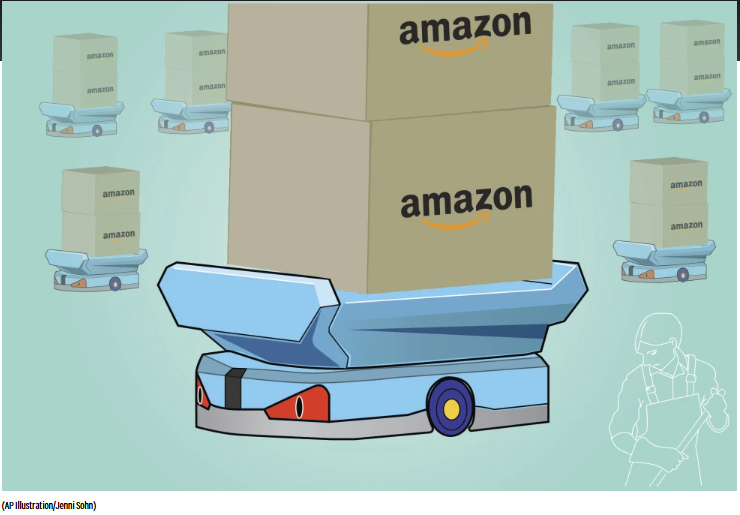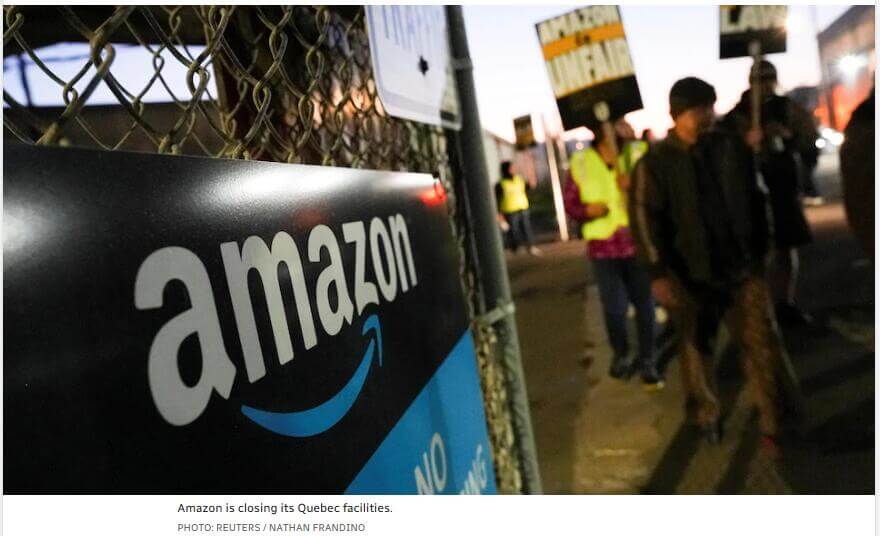Amazon recently announced it’s closing all its operations in Quebec.This move will cut about 1,950 jobs, including 1,700 full-time workers. The company says it’s shifting back to a third-party delivery model, claiming this will save customers money. But labor unions and critics are asking: Is this really about saving money, or is it about getting rid of unionized workers?
A Pattern We’ve Seen Before
This isn’t the first time Amazon’s decisions have raised eyebrows. In February 2023, I wrote about Amazon laying off 18,000 workers. At the time, the company blamed inflation, slowing sales, and supply chain issues. But many of us questioned whether those layoffs were more about automation and avoiding unions. What’s happening in Quebec now feels like history repeating itself.
One of the sites closing is the DXT4 warehouse in Laval, Amazon’s first unionized warehouse in Canada. Workers there joined the Confédération des syndicats nationaux (CSN) in May 2024 and were negotiating their first contract when the closure was announced. The CSN says Amazon’s decision targets unionized workers and violates the Quebec Labour Code.
Amazon denies any ill intentions and accuses the CSN of spreading false information.
It’s worth noting that the CSN aren’t alone in wondering about this- as just last August, a Quebec labor tribunal ruled against Amazon for interfering in union efforts at another site in Lachine.
Automation and Job Loss
Automation seems to play a big role in Amazon’s decisions. While the company hasn’t said the Quebec closures are about robots, it’s worth noting that Amazon has been building more robotic warehouses where machines do the work people used to do.
There’s also the issue of unionization. Unionized workers typically earn around 10% more and receive more comprehensive benefits than their non-unionized counterparts. They’re also more likely to have better access to employer-sponsored health plans and paid sick days. For a company focused on minimizing costs, unionized workers may represent a financial challenge Amazon would rather avoid.
By closing its only unionized warehouse in Canada, Amazon may be signaling a preference for non-unionized labor, where wages and benefits can remain lower. This pattern raises questions about whether cost-cutting decisions are being made under the guise of automation or operational efficiency while effectively undermining workers’ rights.
Are They Being Honest?
Amazon says the switch to third-party delivery in Quebec is an operational decision. But the timing—right after unionization and during labor negotiations—feels off. Quebec’s Minister of Innovation, Science and Industry, François-Philippe Champagne, came out criticizing the move, saying, “This is not the way business is done in Canada.”
This isn’t just about Quebec or Canada for that matter. This trend is part of a larger story about how companies like Amazon are focusing on cutting costs and automating jobs, often at the expense of their workers. This story also highlights how hard it is for unions to protect workers in industries moving toward automation and AI.
Can We Find a Better Way?
In my 2023 article, I wrote, “If you’re going to replace workers with robots because it’s cheaper and easier than dealing with unions, just be honest about it.” That still rings true. People appreciate transparency, and without it, companies risk losing the trust of their employees and customers.
Amazon could take a different approach. It’s not impossible to invest in both technology and fair treatment for workers. Instead of seeing unions as the enemy, companies could work with them to find solutions that work for everyone.
“Today’s workers need ongoing, incremental re-skilling or upskilling to maintain a stable or improving career path. Displaced workers need substantive retraining to get their next job or career. Young people entering the workforce need a foundation of skills aligned with their aptitudes and the prevailing demand for human labor.” – Yossi Sheffi
Mark Twain once said, “If you tell the truth, you don’t have to remember anything.” Amazon’s actions in Quebec point towards a lack of transparency and honesty. Perhaps these closures have nothing to do with unions, but until they’re willing to be fully upfront on their reasoning, people will continue to ask tough questions about their motives.
It doesn’t help that Amazon has a long history of questionable business practices and has been the subject of several lawsuits; including antitrust, class action, and lawsuits over product recall. Companies like Amazon need to realize that innovation and fairness can go hand in hand, and it’s time they start proving it.
An avid book reader and proud library card holder, Angela is new to the world of e-Readers. She has a background in education, emergency response, fitness, loves to be in nature, traveling and exploring. With an honours science degree in anthropology, Angela also studied writing after graduation. She has contributed work to The London Free Press, The Gazette, The Londoner, Best Version Media, Lifeliner, and Citymedia.ca.

